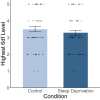Effects of total sleep deprivation on performance in a manual spacecraft docking task
- PMID: 38383574
- PMCID: PMC10881462
- DOI: 10.1038/s41526-024-00361-z
Effects of total sleep deprivation on performance in a manual spacecraft docking task
Abstract
Sleep deprivation and circadian rhythm disruptions are highly prevalent in shift workers, and also among astronauts. Resulting sleepiness can reduce cognitive performance, lead to catastrophic occupational events, and jeopardize space missions. We investigated whether 24 hours of total sleep deprivation would affect performance not only in the Psychomotor Vigilance Task (PVT), but also in a complex operational task, i.e. simulated manual spacecraft docking. Sixty-two healthy participants completed the manual docking simulation 6df and the PVT once after a night of total sleep deprivation and once after eight hours of scheduled sleep in a counterbalanced order. We assessed the impact of sleep deprivation on docking as well as PVT performance and investigated if sustained attention is an essential component of operational performance after sleep loss. The results showed that docking accuracy decreased significantly after sleep deprivation in comparison to the control condition, but only at difficult task levels. PVT performance deteriorated under sleep deprivation. Participants with larger impairments in PVT response speed after sleep deprivation also showed larger impairments in docking accuracy. In conclusion, sleep deprivation led to impaired 6df performance, which was partly explained by impairments in sustained attention. Elevated motivation levels due to the novelty and attractiveness of the task may have helped participants to compensate for the effects of sleepiness at easier task levels. Continued testing of manual docking skills could be a useful tool both to detect sleep loss-related impairments and assess astronauts' readiness for duty during long-duration missions.
© 2024. The Author(s).
Conflict of interest statement
The authors declare no competing interests.
Figures




Similar articles
-
The effect of split sleep schedules (6h-on/6h-off) on neurobehavioural performance, sleep and sleepiness.Appl Ergon. 2016 May;54:72-82. doi: 10.1016/j.apergo.2015.12.004. Epub 2015 Dec 21. Appl Ergon. 2016. PMID: 26851466
-
Cognition Test Battery Performance Is Associated with Simulated 6df Spacecraft Docking Performance.Aerosp Med Hum Perform. 2020 Nov 1;91(11):861-867. doi: 10.3357/AMHP.5602.2020. Aerosp Med Hum Perform. 2020. PMID: 33334406 Free PMC article.
-
Reliability and validity of a 3-min psychomotor vigilance task in assessing sensitivity to sleep loss and alcohol: fitness for duty in aviation and transportation.Sleep. 2021 Nov 12;44(11):zsab151. doi: 10.1093/sleep/zsab151. Sleep. 2021. PMID: 34137863
-
Topographic electroencephalogram changes associated with psychomotor vigilance task performance after sleep deprivation.Sleep Med. 2014 Sep;15(9):1132-9. doi: 10.1016/j.sleep.2014.04.022. Epub 2014 Jun 11. Sleep Med. 2014. PMID: 25087194
-
Decreased salivary alpha-amylase levels are associated with performance deficits during sleep loss.Psychoneuroendocrinology. 2017 Apr;78:131-141. doi: 10.1016/j.psyneuen.2017.01.028. Epub 2017 Feb 1. Psychoneuroendocrinology. 2017. PMID: 28196342
Cited by
-
Simulating microgravity with 60 days of 6 degree head-down tilt bed rest compromises sleep.NPJ Microgravity. 2024 Dec 5;10(1):109. doi: 10.1038/s41526-024-00448-7. NPJ Microgravity. 2024. PMID: 39638792 Free PMC article.
References
LinkOut - more resources
Full Text Sources

